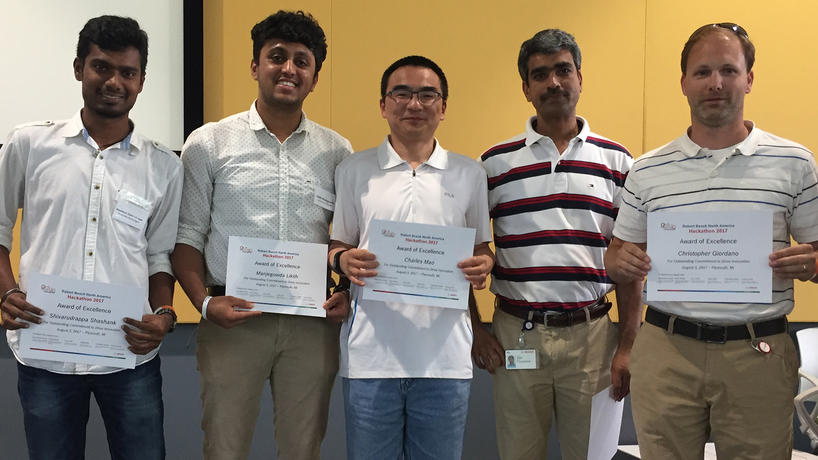
Focused around the theme of smart technologies in everyday life—like the home, car and workplace—Robert Bosch North America (RBNA) employees and University of Michigan-Dearborn students moved excitedly around the tables, sipping coffee and sharing ideas.
They were equipped with computer hardware, sensors, motors, building materials, boards, sticky notes, pens, microphones. And, most importantly, ingenuity.
College of Business and College of Engineering and Computer Science students were invited to join the multinational engineering and electronics company’s RBNA Hackathon, which took place this summer. The hackathon is a way for Bosch employees to engage in creation of novel ideas and collaborate in development of minimally viable prototypes.
Prior to the hackathon, a series of mini events were held for Bosch associates and students to prepare. Events included workshops focused on creativity, collaboration, business models and public speaking, a technical training series, and a weekly question and answer session via Skype.
RBNA Director of Business Development Estella Woo and Manager of Corporate Strategy Preetinder Gill said this was the first time Bosch associates joined forces with students from UM-Dearborn for the hackathon. The event drew 85 people, including 25 UM-Dearborn students and about 60 Bosch associates across 10 business areas.
“Diversity of thought generates better ideas and it gives the teams a more rounded perspective,” Woo said.
UM-Dearborn students were invited after Gill reached out to iLabs Director Tim Davis at the urging of Bosch intern Breann Guerin. Guerin, a digital marketing major, had taken Davis’ Entrepreneurial Thinking course.
Davis had hoped 10 students would participate, since it was summer. But the response was almost overwhelming as 25 students signed up within a week. The students were undergraduate and graduate from various majors across campus.
“They understood what a fantastic opportunity this is,” said Davis, who noted the administrative offices of College of Business, College of Engineering and Computer Science, and the Talent Gateway reached out to students. “Not only are they given tools to code and create. Each student was also paired with a group of Bosch employees. So, for our students, there was mentoring and networking too.”

Hearing about this opportunity through the Talent Gateway, Likith Manjegowda said he saw working with employees at the largest automotive supplier in the world as a learning experience on creating well-developed projects.
“I really wanted to put my ideas into practice, and the Bosch Hackathon was the right platform to start off and bring my ideas to reality,” said Manjegowda, who is studying mechanical engineering. “I now understand what needs to be addressed to convert an idea into a product.”
Manjegowda’s group—made of three Bosch associates and two UM-Dearborn students—came up with the idea “iSee Tomorrow,” a smart cane device that uses infrastructure sensors to help the seeing-impaired maneuver through cities.
For their idea and presentation, the team received the Award of Excellence for Outstanding Commitment to Drive Innovation.
Gill said he was very impressed with both the focus on innovation and the ideas of the UM-Dearborn students.
“Some of the best students come from the University of Michigan. This hackathon has only reinforced this,” Gill said. “Their ideas are fresh and relevant. We are happy to have them here.”
Students shared how grateful they were for the knowledge that Bosch associates shared with them. Manjegowda said it went beyond the coding or business models they had learned.
“What I learned at Bosch will help me create viable solutions for people who need the aid of technology to lead a better life,” Manjegowda said.





